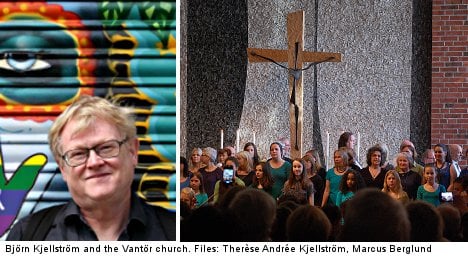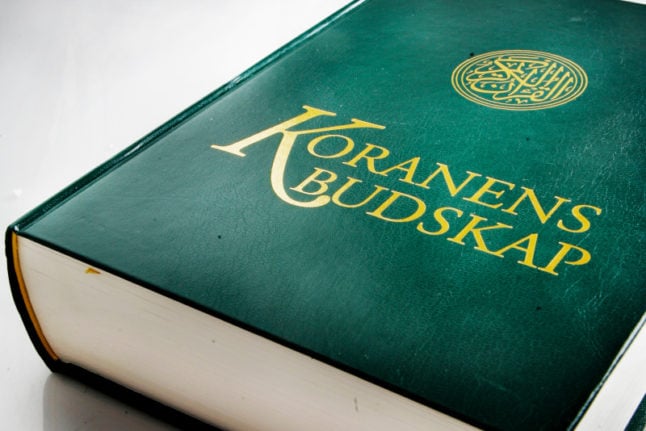Sweden on paper became a secular state at the turn of the millennium, but thirteen years on, 68 percent of the population are still members of the Church of Sweden (Svenska kyrkan).
As September’s church elections to appoint non-clergy representatives at parish, diocese, and national levels draw close, members of various degrees of religiosity have put their names forward. Yet as voter turnout hovers just above ten percent, some are worried the vote could be hijacked by socially conservative or xenophobic forces – if they rally their troops.
Sigurd Persson, 66, has put his name forward in the Vantör parish in southern Stockholm. The cement and brick church sports a new organ but a few weeks ago a local trio played bluegrass between the pews. Persson, whose family’s roots are in the Pentecostal movement in southern Sweden, wants more people to come to church. Making services more fun are part of that, he tells The Local, explaining his decision to run for election.
He admires the pastor pulling in some of the bigger crowds in Stockholm – Olle Carlsson at the Katarina Church in the heart of Stockholm’s Södermalm island. At a recent service, the young woman sitting next to Persson said she actually lived in the northern suburb Bromma.
“People should not have to travel from the other side of town to go to church,” Persson says. “I’d like Vantör to become more like Katarina, where the services are lively. Not that Vantör is dead, we had a bluegrass concert the other day.”
Persson belongs to Conservative Alternative (Borgerligt alternativ) – the new group filling in for the four right-of-centre parties currently in power in Sweden, which will no longer nominate candidates to the church elections. And while Persson does not think that there is much difference between conservatives and socialists in terms of what they want to achieve in the churches, he dislikes that the opposition Social Democrats have made the vote into a political battleground
“How often do you see Social Democrats who put their names forward in the church elections actually go to church on a regular basis?” he asks.
While Persson’s interest in the church elections is both spiritual and social, the Social Democrats have this year launched an appeal to all its members to make sure they head to the ballots in September – to counteract the growing influence of the anti-immigration Sweden Democrats.
While that move is overtly political, there are also those in the Swedish Church who are equally worried by the attitude of some of their Sweden Democrat members.
“Certain Sweden Democrats want us to ban cross-faith services,” says Maria parish pastor Björn Kjellström in Helsingborg, who dubbed the “us and them” thinking he had come across among members of the socially conservative party “un-Christian”.
He also says the Sweden Democrats are out of touch.
“They want to return to some kind of cutesy Sweden which is all about herring, snaps, and folk music – a post card from times past, a Sweden that doesn’t exist any longer,” he says.
“The Sweden Democrats can’t realistically contribute to a current debate about society. We live in Sweden 2013 – we are pluralistic, we are multicultural. That is the world that the Swedish Church operates in and we are there for everyone.”
While elected representatives do outnumber church staff 2:1 at the annual general meeting (kyrkomötet), decisions made there do not have the power to tell individual churches how to allocate their budgets. Which means it is the parish level that risks being more susceptible to a groundswell.
Back in the Stockholm suburbs, local candidate Sigurd Persson says he sees no real threat from Sweden Democrats, but admitted his ideological foes probably do not litter the southern suburbs of Stockholm, where the local government is left-leaning.
Last time around, in 2006, the Sweden Democrats got 2.89 percent of the vote overall, which compares to 44.2 percent for the four conservative parties, and 28.8 percent for the socialist Social Democrats. While voter support just shy of three percent entails no real clout, the low voter turnout means the vote could be susceptible if one group managed to mobilize its troops.
“Only 2,000 of our 20,000 congregation members in Vantör parish voted, so it would not take many more people going to the ballots to stage a coup,” he says, only half-ironically.
“But we are so many Moderates and Social Democrats in our parish that one or two Sweden Democrats won’t make much difference.”
His sanguine attitude to the upstart party’s potential advances jars with the note of panic broadcast by the left-leaning Social Democrat party – which worries not only about the Sweden Democrats, but also the small group Outspoken Church (Frimodig Kyrka) that wants to allow the ordainment of male pastors who disdain their female colleagues.
One of their supporters this week got into a Twitter fight with the Social Democrat communication bureau (S)medjan (The (S)mithy).
@s_medjan Försöker ni dölja att kristna hellre vill gå till konservativa och bibeltrogna kyrkor än till kyrkor med liberalteologi?
— Jonathan Skredsvik (@JSkredsvik) August 6, 2013
“Are you trying to hide that Christians would rather go to conservative and bible-true churches than churches with liberal theology,” tweeted Jonathan Skredsvik.
For Björn Kjellström in Helsingborg’s Maria parish, the grouping’s desire to let male pastors who still dislike women’s ordainment take the cloth is unacceptable.
“It’s a workplace question for me. I don’t want my female colleagues to have to put up with colleagues that don’t accept them,” he says.
There was a special clause that allowed male pastors to be openly against women as priests if they themselves were ordained before the 1958 rewrite that let women into the church. That conscience clause, however, had “run its course,” Kjellström says, and any renewal should be out of the question.
Last time around, in 2005, Outspoken Church received 5.1 percent of the vote. The Sweden Democrats, meanwhile, took home 2.86 percent, which despite being near negligable was near double the support they garnered in 2001. Both of the groups would, in their ideal world, turn back the clocks on the 2009 introduction of same-sex wedding services.
Even if they were to radically up their numbers after September’s elections, it would be well near impossible to force back those clock hands, Kjellström says.
“People try to say that the Swedish Church has fallen prey to pressure from society or bought into some kind of trend, but we worked theologically with this question for many years,” he tells The Local.
“We are more or less by ourselves about same-sex marriages within Christendom, and I don’t think critics who call us weathervanes understand what a high ecumenical price we have paid for it.”
That some openly dream of overturning same-sex marriages, and that for some women’s ordainment is still an issue, is the kind of conservative tailwind that makes Social Democrat candidate Sanna Andersson, 28, feel it is imperative to stand for election.
She disagrees with Conservative Alternative candidate Sigurd Persson’s view that only regular churchgoers should have put their name forward.
“It’s the equivalent of saying that someone shouldn’t be allowed to vote in parliamentary elections because they don’t go to the Riksdag to listen to the MPs debating in real life,” says Andersson, who is running in the Maria Magdalena parish in central Stockholm.
“People need a sound religious alternative, not some crazy sect. There has to be insight, and there has to be a good value system.”
Her party’s position, however, faces flack from the Religious Affairs Minister Stefan Attefall, whose Christian Democrat party no longer names candidates for church elections.
“I say this on a personal level not as a government spokesman, but I think it is wrong that political parties are formally involved in the inner affairs of the church,” Attefall tells The Local. “It’s a remnant from the days when it was the state church and it’s not healthy.”
Yet Andersson’s argument hinges on the political role that the church nonetheless has – whether it be interfaith services or helping to buy groceries and pay bills for Swedes struggling to make ends meet.
“My generation might be leaving the church but I think the church has a very important function in society, partly the spiritual side, partly to sound the warning bell when the authorities fail to take their responsibility and provide adequate welfare,” Andersson argues.
The religious affairs minister, however, countered that while the church should never have to pick up the slack when the state or municipalities fail to maintain an adequate social safety network, he believes that religious organizations have a social role to play in Sweden.
“I only have positive things to say about religious organizations doing more social work, but it doesn’t mean the state or the municipalities should back away,” he says.
Ann Törnkvist



 Please whitelist us to continue reading.
Please whitelist us to continue reading.
Member comments